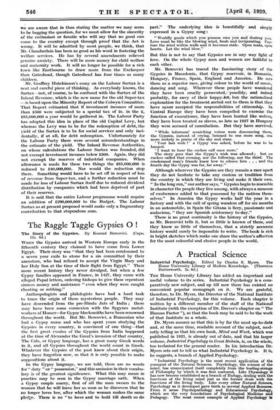The Raggle Taggle Gypsies 0
WHEN the Gypsies arrived in Western Europe early in the fifteenth century they claimed to Wive come from Lower Egypt. Their story was "that they had been condemned to a seven year exile to atone for a sin committed by their ancestors, who had refused to accept the Virgin Mary and her Holy Son at the time of their flight from Egypt." Their more recent history they never divulged, but when a few Gypsy families appeared in France, in 1427, they came with alleged Papal letters, ordering bishops to give these repentant sinners money and assistance " even when they were caught cheating or robbing."
Anthropologists and philologists have had a hard task to trace the origin of these mysterious people. They may have descended from the pm-Hindu Jets of India ; there may have been some connexion with the Sygynes metal- workers of Homer—for Gypsy blacksmiths have been renowned throughout the world. But Mr. Bercovici, a Rumanian who had a Gypsy nurse and who has spent years studying the Gypsies in every country, is convinced of one thing—that the first great exodus of the Gypsies from India happened at the time of Alexander the Great's invasion of that country, The Cabo, or Gypsy language, has a great many Greek words in it, and all Gypsies throughout the world count in Greek. Whatever the Gypsies of the past knew about their origin, they have forgotten now, so that it is only possible to make suppositions about it.
In the Gypsy language, we are told, there are no words for " duty " or " possession," and this omission in their vocabu- lary is of the greatest significance. What this may mean in practice may be seen in the Gypsy marriage oath. When a Gypsy couple marry, first of all the man swears to the woman that he will leave her as soon as he discovers that he no longer loves her, after which the woman makes the same pleige. There is no " to have and to hold till death us do part." The underlying idea is beautifully and simply expressed in a Gypsy song :
" Worldly goods which you possess own you and destroy you, Love must be like the blowing wind, fresh and invigorating. Cap. tore the wind within walls and it becomes stale. Open tents, open hearts. Let the wind blow."
But this is not to say that Gypsies are in any way light of love. On the whole Gypsy men and women are faithful to each other.
Mr. Bercovici has traced the fascinating story of the Gypsies in Macedonia, that Gypsy reservoir, in Rumania, Hungary, France, Spain, England and America. He sees them as a superior race, giving colour to the world of music, dancing and song. Wherever these people have wandered they have been cruelly persecuted, possibly, and indeed probably, for envy of their happy-4ot, but the rationalized explanation- for the treatment _meted out to them_ is that they have never accepted the responsibilities of citizenship. In Central Europe they have been compelled to exercise the function of executioner, they have been hunted like wolves, they have been treated as slaves, as late as 1927 in Hungary they were accused of cannibalism. But they have survived.
" While informers' scratching voices were denouncing them, the Gypsies,. instead of crying, listened to one more song, one more melody in praise of the sky and stars.
' Your last wish ? ' a Gypsy was asked, before he was to be hanged.
I want to hear the cuckoo call once more.'
The story goes that the Gypsy's wish was allowed ; but no cuckoo called that evening, nor the following, nor the third. The condemned man's friends knew how to silence him . . . and the fourth day the Gypsy was far, far away."
Although wherever the Gypsies are they remain a race apart they do not hesitate to take any custom or tradition from the country in which they are living and make it, their own. " In the long run," our author says, " Gypsies begin to resemble in character the people they live among, with always a measure of exuberance added to that possessed by the natives them- selves." In America the Gypsy works half the year in a factory and with the call of spring wanders off for six months in an automobile, in Spain the Gitana is fiery, passionate and audacious, " they are Spanish aristocracy to-day."
There is no great continuity is the history of the Gypsies, as Mr. Bercovici tells it, but so little is known of them, and they know so little of themselves, that a strictly accurate history would surely be- impossible to write. The book is rich in bright sketches which make one share the author's affection for the most colourful and elusive people in the world.






































 Previous page
Previous page